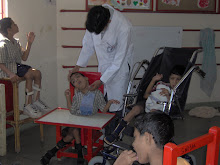Lack of understanding
Some people do not understand the purpose of going to see a man or woman in a white coat who looks into their mouth and uses strange equipment, whilst they are expected to lie on a chair with a large light positioned on their face. They may not have understood the importance of having healthy teeth and gums and the consequences of not having regular appointments.
Sensory issues
This is probably one of the main anxiety triggers at the dentist for individuals with an ASD. The obvious areas of difficulty will be tactile (touch) and auditory (noise). Mouths are extremely sensitive places and for a person with an ASD the sensation of a cold instrument entering their mouth could be very painful. In addition, the noise of the drills and cleaning instruments could also be a problem. Sometimes the taste of the mouth wash or the paste being used will also have an adverse impact.
It is also important to check whether there are any factors in relation to the dentist as an individual that might cause distress; for example, their perfume, moustache, or the colour of their clothing. An information sheet on ASD and sensory issues is available through the Autism Helpline. (See resources list below).
Invasion of space
Dentists are one of the few professionals who we permit to enter our personal space. Most people find this uncomfortable but understand that the dentist needs to be so close in order to examine teeth. For individuals with an ASD this close proximity may well be extremely distressing.
The following strategies are dependent on the person's level of understanding and their individual needs and should be adapted accordingly.
Preparation
As a result of past negative experiences, many carers understandably avoid telling the individual with ASD about their dental visit until the last minute or on the day of the appointment. But even though it may initially cause a behaviour pattern change, it is better in most situations to try and inform the individual as early as possible. This can be difficult if their concept of time is poor. The use of visual supports (for example, a calendar) can help to clarify when an event is occurring.
If it is the individual's first visit to the dentist you may like to take them to meet the dentist and other staff prior to any treatment. You may also like to show them the equipment which the dentist will use and how it works.
It is also important to prepare the dentist and their team by giving them as much information as possible, so they can make adaptations to the procedure and be aware of the individual's needs.
Try to ensure that the appointment is the first of the day. This reduces the chance of the dentist running late and provides enough time not to feel rushed. It is important to note that because some dentists feel that the presence of an autistic may be embarrassing to other patients they may call in the child as the last patient for the day. This approach on the part of the dentist may not be very advisable as an autistic child in the clinic requires the full energy and attention.
Choose your dentist wisely
If a dentist is uncomforatable working with an autistic child, regardless of his or her qualification, the child will be uncomforatble with the dentist. You can ask the dentist if he/she has ever treatted an autistic child before, or if not whether they understand the difficulties and challenges of working with the child. A simple failure to comprehend the needs of the child can result in the child having to undergo treatment under general anesthesia.
Will the child require Sedation or General Anesthesia?
Due to the nature of the disorder, most severely autistic children will require any prolonged treatment under general anesthesia. However allow the dentist to explore the option of treating the child on the dental chair. Sometimes children may well allow the dentist to perform fillings or the extraction of a single tooth on the dental chair. Any use of preoperative sedation must be done under the supervision of the child's physician or a Pediatric Dentist trained in the field of conscious sedation. We do do not endorse the practice of sedating the child at home and bringing him/her for the appointment as the parent may have the tendency to either overdose or under dose the child, both of which are equally detrimental.








1 comment:
Very good post, informative and thorough.
Dentist
Post a Comment